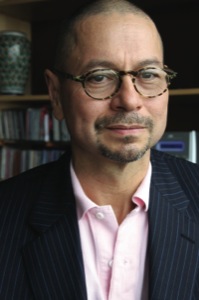
“Books enrich us, they help make us more human and they help diminish the fear that we might have of each other.”
— MICHAEL NAVA
Michael Nava published his first book in 1986. That novel, The Little Death, was published by Alyson Publications, a small gay press that accepted the book after 13 other publishers had rejected it.
The Little Death introduced readers to Henry Rios, a gay, Latino criminal defense lawyer based primarily in Los Angeles. Six further Rios novels followed – Goldenboy (1988), Howtown (1990), The Hidden Law (1992), The Death of Friends (1994), The Burning Plain (1996), and Rag and Bone (2000). Each new novel was greeted with wider and greater critical acclaim. The books were awarded a total of six Lambda Literary Awards and in 2000 Nava was given the Bill Whitehead Award for Lifetime Achievement in gay and lesbian literature.
Fast forward to 2014, and Nava is about to launch his first book in 14 years, The City of Palaces, here in San Diego. Hosted by the San Diego Multicultural LGBT Literary Foundation and the San Diego Human Dignity Foundation the reception is Friday May 2, with honorary hosts Council President Todd Gloria, Councilmember David Alvarez and Board of Education President Kevin Beiser.
Michael Nava, a third-generation Californian of Mexican descent, and the grandson of immigrants, was born in Sacramento. He was the first person in his family to attend college, graduating with a B.A. in history from the Colorado College. He later received his law degree from Stanford University, attending the university at the same time as San Diego LGBT Weekly publisher Stampp Corbin.

Ahead of the official launch reception for The City of Palaces, I had the pleasure of talking to Michael Nava about his long writing career and his new work that has been 14 years in the making.
Steve Lee: Michael, thank you so much for talking to us. Let’s start at the very beginning. What made you want to become a writer?
Michael Nava: Well, Steve, being a writer is not a choice so much as it is a compulsion. I began to write seriously when I was about 12. I’ve never stopped. I’ve tried to a couple of times because writing is hard work and not particularly rewarding. But after a while I become even more restless and irritable than usual, and the only cure is working on a story.
You had your first book published 28 years ago. What has driven you to keep writing?
Again, writing is something that some people are born to do. I’m one of those. Also, when you write novels, you see the world in terms of stories, and your mind gets filled with stories that beg to be told.
You are known as an award-winning mystery writer developing the character of Henry Rios – a gay, Latino criminal defense lawyer. Tell us a little about Rios and what inspired you to create such a character and develop a series of novels featuring him?
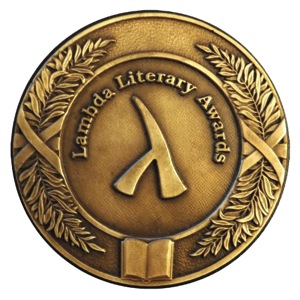
Actually, Steve, I didn’t set out to be a mystery writer or to write a mystery series or even a fiction writer. Until I was in my early 20s I only read and wrote poetry. I stopped writing poetry in law school – there’s not much poetry in the law – and turned to fiction. I wanted to write about the experience of being a gay man in an oppressively straight society. This was 1979, remember, when the LGBT movement was in its infancy. I needed a literary vehicle to do that, and at the time I was reading the mystery novels of Joseph Hansen whose protagonist was David Brandstetter, a gay insurance investigator. Brandstetter was an openly gay man. He was not conflicted about being gay. He was a decent, responsible human being making his way through a world that despised him and his kind. Unlike the gay characters in so much gay fiction, he also had a profession that he did well. I completely identified with him as a reader and, as a writer, I thought, here is the literary vehicle I need to explore what it means to be an outsider.
In American crime fiction, the detective is often an outsider, someone who has all the virtues mainstream society pretends to honor – decency, courage, loyalty – but rarely practices. And because he (it was always a “he” back in the day) is called in to clean up the messes of “respectable” folk, he has a ringside seat to the greed and hypocrisy that lurks just behind respectability. To me, that detective character in classic American crime fiction described the experience of being gay; the decent outsider despised by respectable society.
So, in that spirit I wrote the first novel, which took several years to finish. Like Brandstetter, Rios is a fundamentally good man who must contend with social and cultural disapproval directed at something in himself he could not change even if he wanted to, which he doesn’t. So, anyway, I wrote the first book. Sasha Alyson published it and it did well enough for him to ask for a second book. I still had something left to say about Rios so I agreed. After the second book, an agent reached out to me and said New York publishers were interested. And that’s how the Rios series came to be.
You also have had a distinguished career as an appellate lawyer in California and have worked hard as an advocate for greater diversity in the legal profession? Tell us about that and why it is so important to you?
Those efforts have been aimed mainly at the underrepresentation of Latino/as in the legal profession and in the judiciary. Why is it important? Because we are moving toward an apartheid system in the law where the majority of people who get entangled in the law are people of color and the majority of people who run the system are white. This is simply unacceptable in a state where Latino/as are becoming the numerical majority.
Do you have more gay readers than straight readers? And if so why do you think that’s the case?
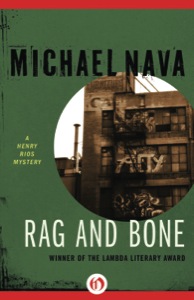
I don’t know for sure but I assume so. I read LGBT writers because they tell my story and the stories of people like me. I would guess that’s why LGBT readers read the Rios novels. The problem with straight readers is that many – certainly not all – of them continue to believe that a story about a gay person couldn’t possibly be relevant to their human experience. Of course they are wrong. I read straight writers too and identify with some of the stories they tell. There’s no reason it shouldn’t work the other way, except for stereotypes that many straight people still harbor about us.
Now let’s turn to your latest book, The City of Palaces. With this historical fiction novel you have taken a whole new turn. Can you tell us why you retired Henry Rios and what made you change genres?
I said everything I wanted to say as a writer through the vehicle of mysteries, so I didn’t see any reason to continue writing them. As I said earlier, I never set out to be a mystery writer per se. It was just a convenient literary device to explore the experience of being gay. As I became more interested in my Mexican and Indian heritage, I looked around for a different vehicle to explore that side of my story. Since so few people in this country know anything about the actual history of Mexico – and I include Latino/as in that group – historical fiction seemed a good way to tell that story.
The City of Palaces is the first of a series of forthcoming novels entitled The Children of Eve. How did this evolve from a novel about the life of gay silent film star Ramon Novarro to the plight of an Indian tribe to the Mexican Revolution?
Novarro and his family fled Mexico during the revolution because the country was in the midst of a terrible civil war. If you think about what’s happening in Syria today, you get some idea of the violence and turmoil that gripped Mexico from 1910 into the early 1920s. I couldn’t tell the story of Jose – the character based on Novarro – without explaining how he got to Hollywood. Ultimately that meant going back and telling the story of his family and its flight from the revolution. That’s what the first book is about. The Indian tribe you refer to, the Yaquis, made their home in northern Mexico until they were almost exterminated by the Mexican army in the late nineteenth century. A few Yaqui families escaped into Arizona. One of them was my grandfather’s family. He was a full-blooded Yaqui. In the early 1920s, when he was a teenager, he ended up in Los Angeles where he worked as an extra in silent Westerns. So all these threads – Novarro, the revolution, the silent film industry, the fate of the Yaquis, my grandfather – have come together for me in these books.
You live close to San Francisco. How important is San Diego to you in launching this new book?
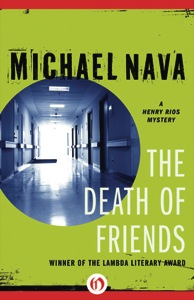
I’m a third generation Californian and I lived in the north, the south, the central valley and the desert, so I regard all of California as my backyard. I have close family connections in San Diego and I visit now and then. I was most recently in town last spring to watch a Padres-Giants series. The Giants got swept but I still had a good time at your beautiful baseball park. San Diego is also the home to the San Diego Multicultural LGBT Literary Foundation, the only literary organization that specifically promotes the work of LGBT writers of color. I am a big supporter of the Foundation and I hope that my San Diego launch will bring some attention to it.
What advice would you give a young LGBT writer just setting out on his career today?
Don’t concern yourself about anything except the quality of your work. Good writing will find its audience.
Finally Michael, you went to Stanford with our publisher Stampp Corbin? Tell us some of your memories of that time?
Actually, he was an undergraduate and I was a law student, so if our paths crossed at all, it would have been at the Gay Student Union. I liked Stanford but disliked law school. San Francisco was an hour by train and the pre-AIDS party was definitely going on in the bars, clubs and bath houses. I was a wallflower at that party. I wasn’t looking for sex but for love. Once I met my first partner at Stanford, I was only too happy to settle down. He and I were together for nine years and still remain close friends. In any event, the past, my own personal history, doesn’t interest me very much. I mine my memories for material for writing but otherwise I rarely think about it. I try to live in the present.
Thank you, Michael for talking with us and we look forward to the launch of your new book.
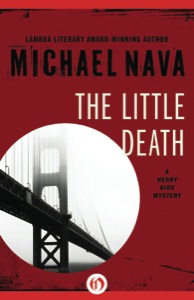
Thank you, Steve. I appreciate the opportunity you’ve given to me to speak to the community.
San Diego’s official launch party for Michael Nava’s new novel, The City of Palaces is hosted by the San Diego Multicultural LGBT Literary Foundation and the San Diego Human Dignity Foundation on Friday, May 2 from 6-8 p.m. at the Debra Hoffman Room at the San Diego Foundation, 2508 Historic Decatur Road, Suite 200, in San Diego.
Tickets are $50 and include a copy of The City of Palaces, and complimentary food and drink. Tickets can be purchased online at mylgbtfoundation.org/events or by phone at 619-291-3383.
For more information on Michael Nava and his work, visit michaelnavawriter.com











